
Imagine a workplace where everyone feels heard, appreciated, and genuinely excited to come to work. Sounds like a dream? Well, employee satisfaction survey questions can turn that dream into reality.
These powerful tools provide a direct line of communication between you and your team, offering invaluable insights into their experiences, needs, and ideas.
In this guide, we’ll explore the ins and outs of employee satisfaction surveys and show you how they can transform your workplace into a thriving hub of productivity and positivity.
Let’s begin with an exciting video tutorial.
Watch: How to Create Awesome Employee Engagement Surveys: 6 Quick Tips
What Is an Employee Satisfaction Survey?
An employee satisfaction survey is a structured questionnaire designed to gauge how content and fulfilled your employees are with various aspects of their jobs and the overall work environment.
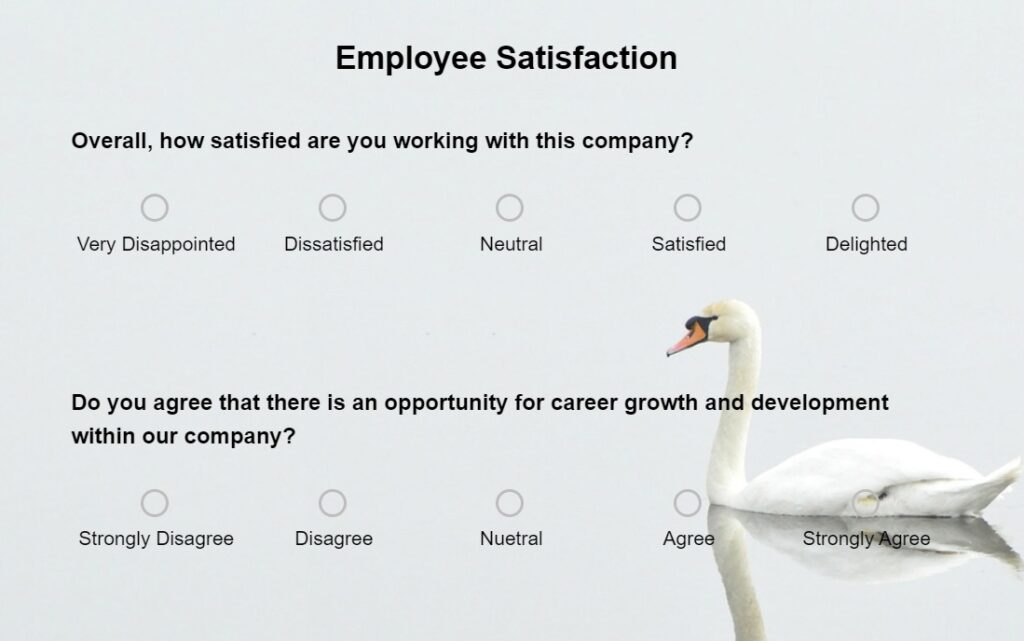
By giving your employees a voice, you gain valuable insights into their experiences, needs, and ideas. You’ll discover what’s working well and what needs improvement, allowing you to create a workplace where everyone feels happy, valued, and motivated.
Employee satisfaction survey gives a chance for employees to share their honest feedback and perspectives on topics such as:
- Job Satisfaction: How they feel about their roles, responsibilities, workload, and opportunities for growth.
- Work Environment: Their thoughts on the physical workspace, company culture, communication, and collaboration.
- Leadership and Management: Their opinions on their managers, supervisors, and the overall leadership within the company.
- Compensation and Benefits: Their satisfaction with their salary, benefits package, and other forms of recognition.
By gathering this valuable data, you can identify areas where your company excels and areas that need improvement, allowing you to create a workplace where everyone feels valued, supported, and motivated.
What Questions Should You Include in an Employee Satisfaction Survey?
Creating an effective employee satisfaction survey means getting to the heart of what really matters to your team. It’s about asking the right questions that touch on every aspect of their work life—from company culture to work-life balance.
Here’s a breakdown of key categories and some sample questions to help you craft a survey that uncovers valuable insights.
1. Company Culture
Company culture defines the overall vibe of your workplace. It’s not just about the company’s mission and values; it’s about how employees feel within that environment. A positive culture fosters teamwork, loyalty, and engagement, while a toxic culture does the opposite. Here are some questions to gauge how employees perceive your company culture:
- How would you describe the overall culture of our company?
- Do you feel aligned with the company’s mission and values?
- Do you feel respected and valued as an individual in this company?
- Does the company encourage diversity and inclusivity?
- How well does the company handle issues related to ethics and fairness?
- Do you feel a sense of belonging at work?
- Are company goals clearly communicated to you?
- Do you feel proud to work at this company?
- How well does the company handle recognition of employee achievements?
- Do you feel the company supports a healthy work environment?
2. Employee Job Satisfaction
Job satisfaction questions help you understand if employees feel fulfilled in their roles. Are they motivated by their work, or are they just clocking in and out? Happy employees are productive employees, so these questions are crucial to uncovering how they really feel about their day-to-day duties.
- How satisfied are you with your current role?
- Do you find your work challenging and interesting?
- Do you feel your skills are being utilized to their fullest potential?
- Are you satisfied with the level of autonomy you have in your job?
- How often do you feel excited to come to work?
- Are you satisfied with the workload assigned to you?
- Do you feel that your job responsibilities are clear?
- How likely are you to recommend this company as a great place to work?
- Do you receive sufficient feedback on your performance?
- Are you proud of the work you do?
3. Professional Growth
Opportunities for professional growth are critical in retaining top talent. Employees want to know that they have room to grow, learn, and advance within the company. If growth is limited, it can quickly lead to disengagement. These questions will help you gauge how employees feel about their growth opportunities.
- Are you satisfied with the opportunities for professional development?
- Do you feel the company invests in your career growth?
- Are there clear paths for advancement in your role?
- Do you receive adequate training to perform your job well?
- How satisfied are you with the mentorship opportunities available?
- Does the company support your educational or certification goals?
- Are there enough learning resources available to you?
- Do you feel encouraged to expand your skill set?
- How often do you have conversations about your career development?
- Do you feel supported when seeking out new learning opportunities?
4. Manager Relationship
The relationship employees have with their managers can make or break their job satisfaction. Good managers inspire and support their teams, while poor managers can be a significant source of frustration. Here are some questions to evaluate the employee-manager dynamic.
- Do you feel supported by your manager?
- Does your manager provide clear direction and feedback?
- How approachable is your manager when you have questions or concerns?
- Does your manager recognize your efforts and accomplishments?
- Do you feel comfortable discussing your career goals with your manager?
- Does your manager foster a positive team environment?
- How often does your manager check in on your progress?
- Does your manager help you prioritize tasks effectively?
- How well does your manager communicate expectations?
- Do you feel your manager listens to your concerns?
5. Compensation and Benefits
Fair compensation and good benefits are key motivators for employees. If employees feel underpaid or that their benefits are lacking, it can severely impact their overall satisfaction. These questions can help you understand if your compensation packages meet employee expectations.
- Are you satisfied with your overall compensation?
- Do you feel your salary reflects the value you bring to the company?
- How satisfied are you with the company’s health and wellness benefits?
- Are you satisfied with the company’s retirement plan options?
- Do you feel you are fairly compensated compared to industry standards?
- Are bonuses and raises awarded fairly in the company?
- Do you understand the company’s compensation structure?
- How satisfied are you with the paid time off and leave policies?
- Are you satisfied with the non-monetary perks offered by the company?
- Do you feel your benefits package meets your personal and family needs?
6. Work-Life Balance
Work-life balance is no longer just a buzzword; it’s a crucial part of employee satisfaction. It’s about ensuring employees can manage their personal and professional lives without undue stress. By addressing this area, you show that you value your employees’ time and well-being.
- Do you feel you have a good work-life balance?
- Are you satisfied with your current working hours?
- Does the company offer flexible work options (e.g., remote work, flexible hours)?
- Do you feel you have enough time to disconnect from work?
- How often do you feel overwhelmed by your workload?
- Are you satisfied with the company’s policies on vacation and personal leave?
- Do you feel encouraged to take breaks during your workday?
- How often do work demands interfere with your personal life?
- Do you feel supported by your employer when dealing with personal or family issues?
- Are you able to manage your stress levels effectively while working here?
These tailored questions will help you create a comprehensive employee satisfaction survey that goes beyond surface-level insights. By diving deeper into these key areas, you’ll be equipped to make meaningful improvements that enhance the overall employee experience.
Why Is it Important to Conduct an Employee Satisfaction Survey?
Think of employee satisfaction surveys as your company’s health check-up. Just like regular check-ups keep you informed about your physical well-being, these surveys offer a snapshot of your company’s “emotional” health. They reveal what’s working well and where there’s room for improvement, allowing you to make informed decisions that boost morale, engagement, and productivity.
Here are a few compelling reasons why conducting employee satisfaction surveys is a smart move:
- Boost Employee Morale & Engagement: When employees feel heard and valued, they’re more likely to be engaged and enthusiastic about their work. Surveys create a platform for open communication, demonstrating your commitment to their well-being.
- Reduce Turnover: High employee turnover is costly and disruptive. By proactively addressing issues identified in surveys, you can create a positive work environment that encourages employees to stay.
- Improve Productivity: Happy employees are productive employees. By identifying and resolving obstacles to their success, you can foster a workplace where everyone can thrive.
- Enhance Company Culture: Surveys help you understand and shape your company culture. By gathering feedback on values, communication, and collaboration, you can create a positive and inclusive environment.
- Attract Top Talent: A reputation for caring about employee well-being can be a powerful recruiting tool. Prospective employees are more likely to choose a company that values their opinions and fosters a positive work environment.
In essence, employee satisfaction surveys are your secret weapon for building a thriving and successful company. By investing in your employees’ happiness, you’re investing in the future of your business.
Tips to Get the Best Employee Feedback
Here are some effective tips to encourage honest and valuable employee feedback through your surveys:
- Ensure Anonymity and Confidentiality: Assure your employees that their responses will remain anonymous and confidential. This encourages them to be open and honest without fear of repercussions.
- Communicate the Purpose and Importance: Clearly explain why you’re conducting the survey and how their feedback will be used to create positive change. When employees understand the value of their input, they’re more likely to participate and provide thoughtful responses.
- Keep it Short and Simple: No one likes a long and tedious survey. Keep your questionnaire concise and focused, using clear and straightforward language.
- Offer a Variety of Question Types: Use a mix of multiple-choice, rating scale, and open-ended questions to capture a range of perspectives and insights. Open-ended questions provide valuable qualitative data that can reveal underlying issues and opportunities.
- Time it Right: Choose a time when employees are less likely to be stressed or overwhelmed, such as mid-week or towards the end of the workday. Avoid conducting surveys during busy periods or major deadlines.
- Promote Participation: Encourage participation through various communication channels, such as email, company intranet, and team meetings. Make it easy for employees to access the survey, providing clear instructions and deadlines.
- Follow-Up and Take Action: After the survey, share a summary of the results and outline the steps you’ll take to address any concerns or implement suggested improvements. This demonstrates that you value their feedback and are committed to creating positive change.
By actively seeking and valuing employee input, you can create a workplace where everyone feels heard, appreciated, and empowered to contribute to the company’s success.
FREE. All Features. FOREVER!
Try our Forever FREE account with all premium features!
Free Survey Templates and Online Resources
When it comes to understanding how your employees truly feel, survey templates provide a quick and effective way to gather actionable feedback. Employee satisfaction plays a key role in improving retention, boosting productivity, and fostering a positive work environment. With ProProfs Survey Maker, you have access to a range of ready-to-use employee survey templates that help you zero in on the most important aspects of employee experience. Plus, ProProfs offers an AI-powered tool that simplifies the process of creating customized surveys tailored to your specific needs.
Here’s an overview of the types of employee satisfaction survey templates ProProfs Survey Maker offers, along with details on how each can help your organization:
1. Employee Satisfaction Surveys
Understanding how satisfied employees are with their jobs is crucial for maintaining morale and productivity. ProProfs’ Employee Satisfaction Survey template allows you to gather insights into areas such as workplace environment, compensation, job responsibilities, and overall job happiness. This type of survey helps you identify strengths and areas needing improvement within your company.



Sample questions include:
- How satisfied are you with your current role and responsibilities?
- Do you feel your contributions are valued by the company?
- How satisfied are you with your work-life balance?
- Do you believe the company supports your professional growth?
- What changes could improve your satisfaction with your job?
2. Employee Satisfaction NPS
This template incorporates the Net Promoter Score (NPS) methodology to gauge employee satisfaction and loyalty. It measures the likelihood of employees recommending the organization to others.
Here, using a single question, “How likely are you to recommend our organization to your friends and family on a scale of (0-10)?”, you get to understand your employee loyalty.
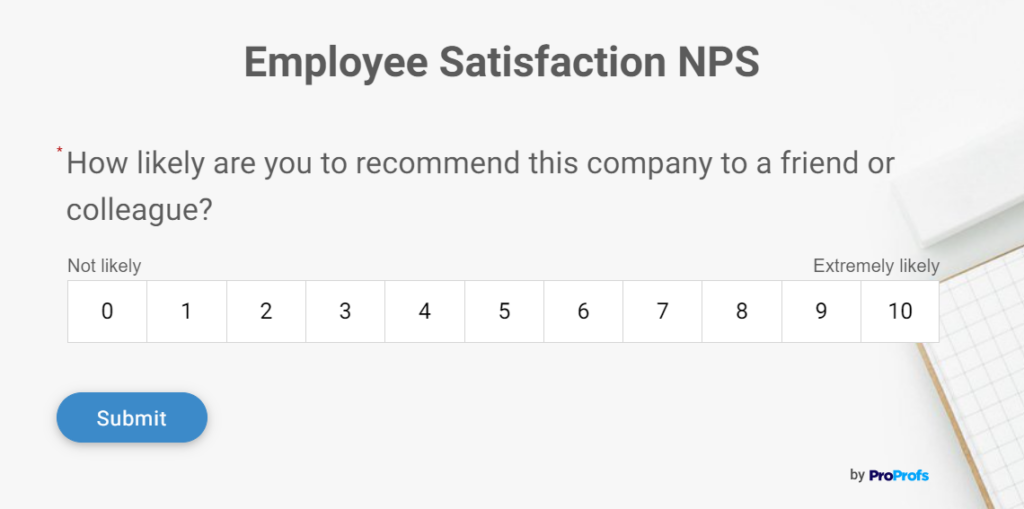

3. Employee Engagement Surveys
An engaged workforce is more productive and committed to the company’s success. The Employee Engagement Survey template helps assess how emotionally connected employees feel to their work, their team, and the company as a whole. This feedback can guide efforts to improve engagement through better communication, recognition, or development opportunities.
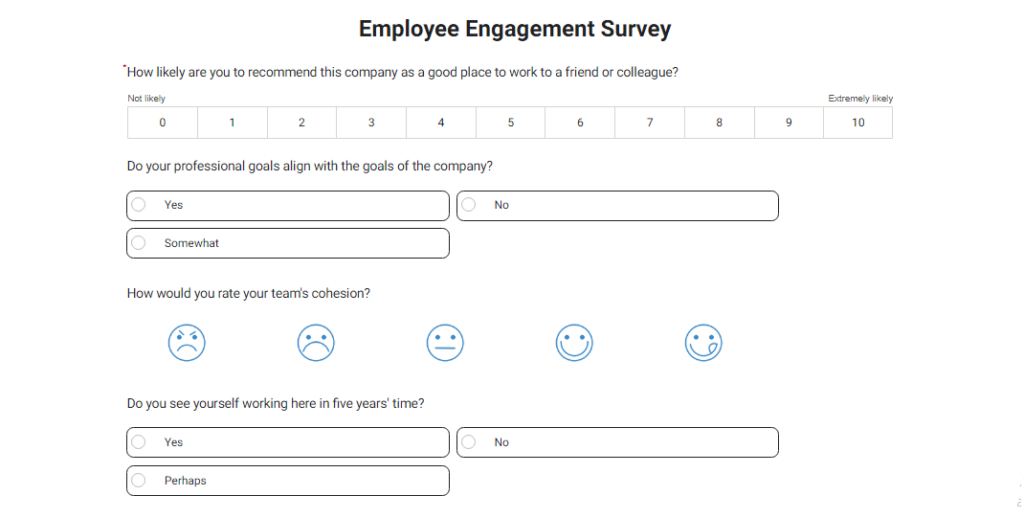

Sample questions include:
- Do you feel motivated to give your best effort at work?
- How well do you understand the company’s goals and your role in achieving them?
- Do you feel a sense of pride working for this company?
- How often do you feel your ideas and contributions are valued?
- Would you recommend this company as a great place to work?
4. 360-Degree Feedback Surveys
A 360-degree Feedback Survey gathers input from an employee’s peers, subordinates, and supervisors for a comprehensive understanding of employee performance. This holistic view offers insights into leadership, teamwork, and interpersonal skills, and it helps employees see how their actions affect others in the workplace.
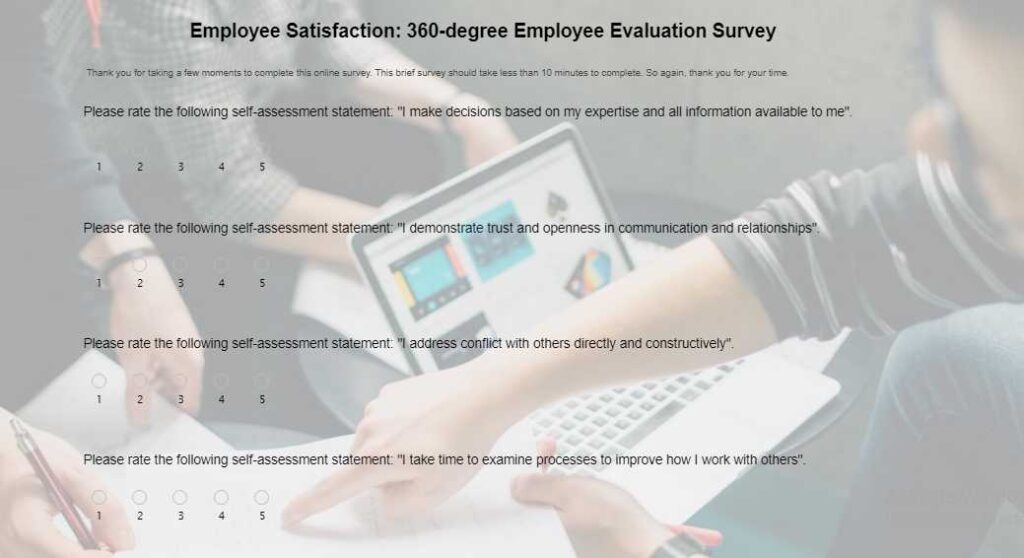

Sample questions include:
- How well does this employee collaborate with their team?
- How effectively does this employee communicate across different departments?
- Does this employee exhibit strong leadership skills?
- How open is this employee to constructive feedback?
- In what areas can this employee improve?
5. Employee Exit Surveys
When an employee leaves, it’s an opportunity to understand the reasons behind their decision and identify potential areas for improvement. The Employee Exit Survey template asks departing employees about their experience at the company, what prompted their departure, and what could have been done differently. This feedback can be invaluable in improving employee retention.
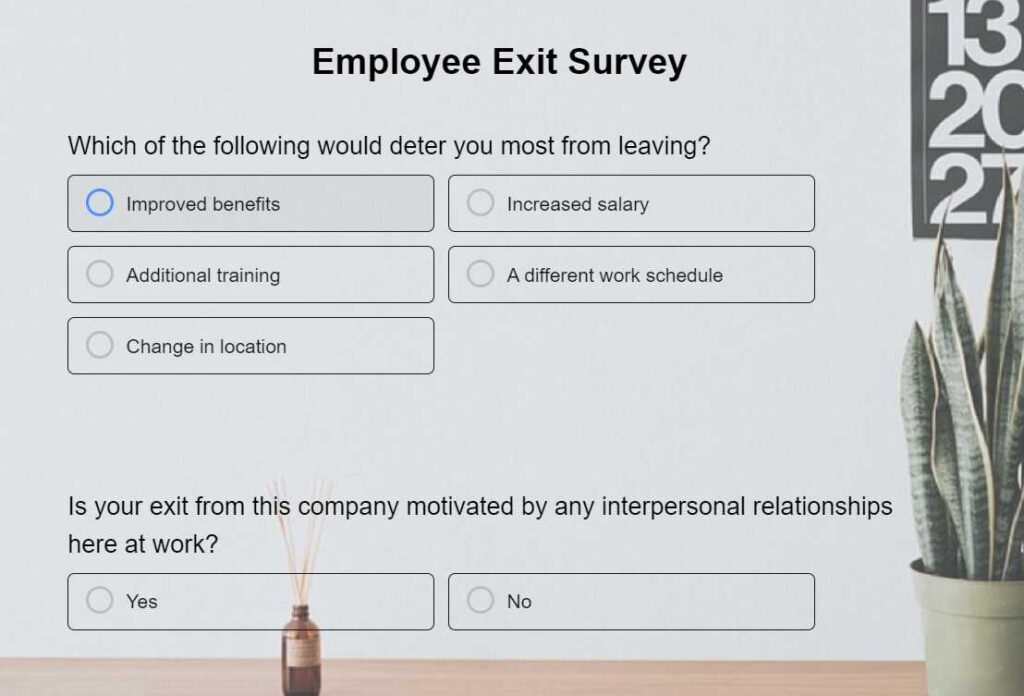

Sample questions include:
- What were your primary reasons for leaving the company?
- How satisfied were you with the support provided during your tenure?
- Did you feel there were opportunities for growth and advancement?
- How would you describe your relationship with your manager and team?
- What could the company have done to encourage you to stay?
| ProProfs Survey Maker offers a comprehensive suite of employee-focused templates, and I’ve highlighted a few key options. Explore all the employee templates here to find the one that best suits your needs. |
6. AI Survey Maker for Customized Surveys
In addition to the pre-built templates, ProProfs Survey Maker offers an AI-powered survey maker that enables you to create personalized surveys in minutes.
If you’re unsure of which questions to ask or how to structure a survey, the AI tool can generate custom surveys tailored to your organization’s unique needs, focusing on areas such as employee engagement, satisfaction, or performance.
Here’s what generating survey questions using AI will look like:
Create a Strong Culture of Employee Satisfaction By Asking the Right Questions
Analyzing employee satisfaction keeps you updated about your employees’ sentiments – their happiness with the pay and perks, their relationship with their managers, and their satisfaction with work recognition.
Employee satisfaction surveys can be miraculous for your business, reducing employee turnover rates and encouraging behavioral changes at the workplace.
Ensure that the employee survey questions are simple and jargon-free. Also, keep your survey questions unbiased to ensure a fair set of responses. If you want to get started with an employee satisfaction survey, try ProProfs Survey Maker to access more than 100+ custom survey templates!
Learn More About Employee Satisfaction Surveys
1. What is the purpose of an employee satisfaction survey?
The purpose of an employee satisfaction survey is to gauge how content employees are with various aspects of their job, such as work environment, management, and growth opportunities. It helps identify areas that need improvement to enhance overall employee well-being and retention.
2. Are employee satisfaction surveys really anonymous?
Employee satisfaction surveys can be anonymous if designed that way. Anonymity encourages honest and open feedback by ensuring employees feel safe sharing their true opinions without fear of repercussions.
3. How to answer an employee satisfaction survey?
Answer employee satisfaction surveys honestly and thoughtfully. Provide specific feedback where possible to help your employer understand your concerns, areas of satisfaction, and suggestions for improvement.
4. How to improve employee satisfaction survey results?
To improve survey results, focus on addressing key concerns raised by employees, such as better communication, recognition, opportunities for growth, and work-life balance. Actively engage with employees and demonstrate commitment to making improvements.
5. How to survey employee satisfaction?
To survey employee satisfaction, use a structured survey tool like ProProfs Survey Maker, with questions covering areas like job satisfaction, work environment, and leadership. Ensure the survey is easy to access, anonymous if necessary, and encourages open feedback.
 Tips
Tips
We’d love to hear your tips & suggestions on this article!
FREE. All Features. FOREVER!
Try our Forever FREE account with all premium features!


 We'd love your feedback!
We'd love your feedback! Thanks for your feedback!
Thanks for your feedback!







